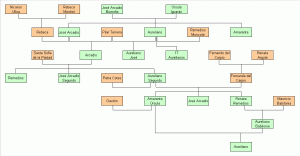 Gabriel Garcia Marquez’s One Hundred Years of Solitude follows the Buendía family and the town of Macondo, which was founded by their patriarch, José Arcadio Buendía. The family and the town that they founded are plagued by supernatural occurrences and technological advancement, the differences between which are sometimes confused, such as with the introduction of ice in the first chapter. The story follows numerous plotlines over a long span of time and contains a large cast of characters, many of whom share names, parentage, and lovers. This makes the novel both somewhat difficult to follow and incredibly rich. In this analysis, I will focus on the roll that incest plays in the story.
Gabriel Garcia Marquez’s One Hundred Years of Solitude follows the Buendía family and the town of Macondo, which was founded by their patriarch, José Arcadio Buendía. The family and the town that they founded are plagued by supernatural occurrences and technological advancement, the differences between which are sometimes confused, such as with the introduction of ice in the first chapter. The story follows numerous plotlines over a long span of time and contains a large cast of characters, many of whom share names, parentage, and lovers. This makes the novel both somewhat difficult to follow and incredibly rich. In this analysis, I will focus on the roll that incest plays in the story.
The patriarch and matriarch of the Buendía family, José Arcadio Buendía and Úrsula Iguarán, were first cousins. At the beginning of their relationship, Úrsula refused to consummate the marriage for fear that their close relation to each other would result in deformed offspring; specifically, that their children would be born with the tails of pigs. José Arcadio Buendía, after being accused of impotence by his cockfighting competitor Prudencio Aguilar, murdered him and then forced Úrsula to consummate the marriage. Their children were not born with pigs’ tails, but they suffered for Úrsula and José Arcadio Buendía’s sin nonetheless.
There is a curse of cyclicality and solitude laid on the family as a result of the sins of Úrsula and José Arcadio Buendía (these being their incestuous relationship and possibly the murder of Prudencio Aguilera as well). Throughout the story, Úrsula seems to be the only one aware of what is happening to the family, keeping her reason and lucidity into her unnaturally old age and warning against the dangers of incest, however unsuccessfully. It continued to plague the family until the line eventually ended with Aureliano, a member of the sixth generation of the Buendía family, whose parents were aunt and nephew to each other and who, having been the child finally born with the tail of a pig, died in infancy.
The sexual relationships between members of the Buendía family contribute to the impression that time in Macondo, or at least for the Buendía family, is cyclical and repetitive. The newer members of the Buendía family do not move forward in the way that people should, but double back on themselves and their family history by having relations with members of the older generations and repeating their family’s mistakes. When they do enter into relationships with non-relatives, these branches of the family tree do not generally last, and in the end either die off or return to incest.
In addition to the theme of cyclicality there is the obvious theme of solitude. The family, and consequently the entire town of Macondo, are cursed to 100 years of solitude from the beginning (be that the consummation of Úrsula and José Arcadio Buendía’s marriage or the founding of the town), though they do not know it, and they are isolated in the end, forgotten by the world. The trend of incestuous relationships within the Buendía family also contributes to this. The members of the family cannot disperse into the wider world by entering into/creating new, long-lasting family lines. Instead, they continue to breed amongst themselves, resulting in the perpetuation of the isolation aspect of the curse.
You bring up a good point of how the incest of the Buendía family continues their isolation. It feels as if it’s part of a self-fulfilling part of the curse. By returning to incest they are perpetuating their own misery
I wonder what relationship (or echo?) you might see in the fact that ancient myths also frequently involve incest, in particular between the gods.
I think that your analysis on the function of incest in the Buendia family is interesting. Which also has something to do with the knowledge that some Hispanic cultures still perform the act of incestuous marriage (usually cousins or first cousins)